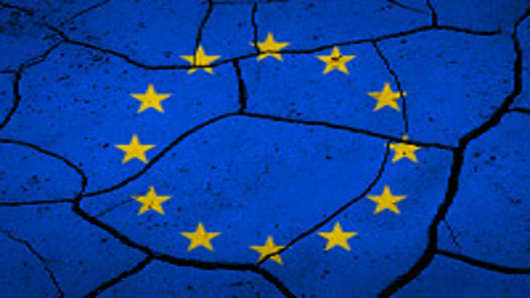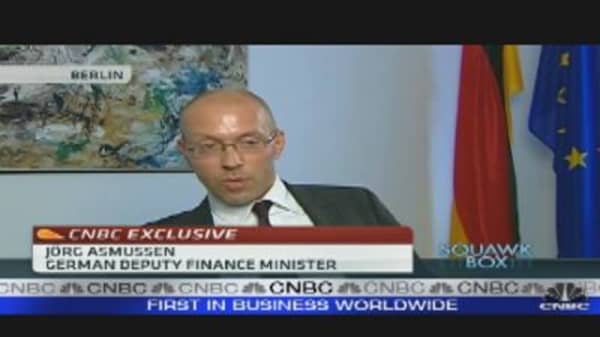The size of the new fund earmarked for bailing out struggling euro zone economies is "enough" at 440 billion euros ($635 billion), a key German policymaker told CNBC Wednesday.
Jorg Asmussen, Germany's deputy finance minister, sent out a signal to the markets that the region's biggest economy wants to limit the size of the planned new European Financial Stability Facility (EFSF) to its current remit, in an interview with CNBC.
He also claimed that European banks do not need immediate recapitalization, despite increasing concerns about the health of banks with exposure to struggling peripheral economies such as Greece and Portugal, and even about the survival of the euro.
German Chancellor Angela Merkel is facing increasing problems getting the measures past the German parliament, which is due to vote on September 23.
At the weekend, German newspaper reports stated that 23 lawmakers from Merkel's own coalition have said they will not back the reforms.
There are concerns that her own coalition partners will reject the proposals, which mean that Germany, which has recovered well from the 2008 credit crisis, will have to help weaker euro region economies.
There have even been mutters in the market that the euro may not survive this current crisis.
"(The EFSF) as a tool has enough to limit contagion and this is a real step forward after the two leaders summit of the eurozone," Asmussen said.
"When we come to the size, we are building up an effective lending capacity of 440 billion euros. On top of this you have IMF money available. So I think the size of the EFSF is enough."
European Commission President Jose Manuel Barroso said earlier in August that he believes the new facility will be sufficient, but reserved the right to reassess the size of the fund if necessary.
The proposed new EFSF will have four new instruments compared to the current facility, including the power to buy government bonds and provide precautionary credit lines to countries. There has been speculation that it might be used to recapitalize some of Europe's banks.
Even behemoths such as French bank Societe Generale have suffered huge share price falls this month after speculation about their exposure to struggling eurozone economies.
On Tuesday, Danske Bank, Denmark's largest bank, was forced to deny rumors on social networking site Twitter that it would make a loss in the third quarter.
"I don’t see an immediate need for the recapitalisation of European banks," said Asmussen, citing rising capital ratios in German banks. "One needs to be prepared and this is why we have the new tool at the EFSF if something happens in the future."
There has also been dissension within the eurozone countries, with Finland asking for collateral for the second Greek bailout.
"We have to find a solution for Finland that is just valid for Finland no other country… and that all others could agree to," said Asmussen.
"This is a very thin line… We have some time to go because the secondary programme will not reach us, let's say, before October but I’m confident that we will find a solution."
Asmussen reiterated the German government's negative stance on a potential Eurobond, a mooted bond for the entire region. He said that he "would not speculate" on what pre-conditions the German government might need before agreeing to a Eurobond.
"We made it clear that in the current state, the Eurobond is not part of the solution from our perspective," he said. "So let’s try to do things in the short term which are needed and not speculate on what might happen in 10 or 20 years."





